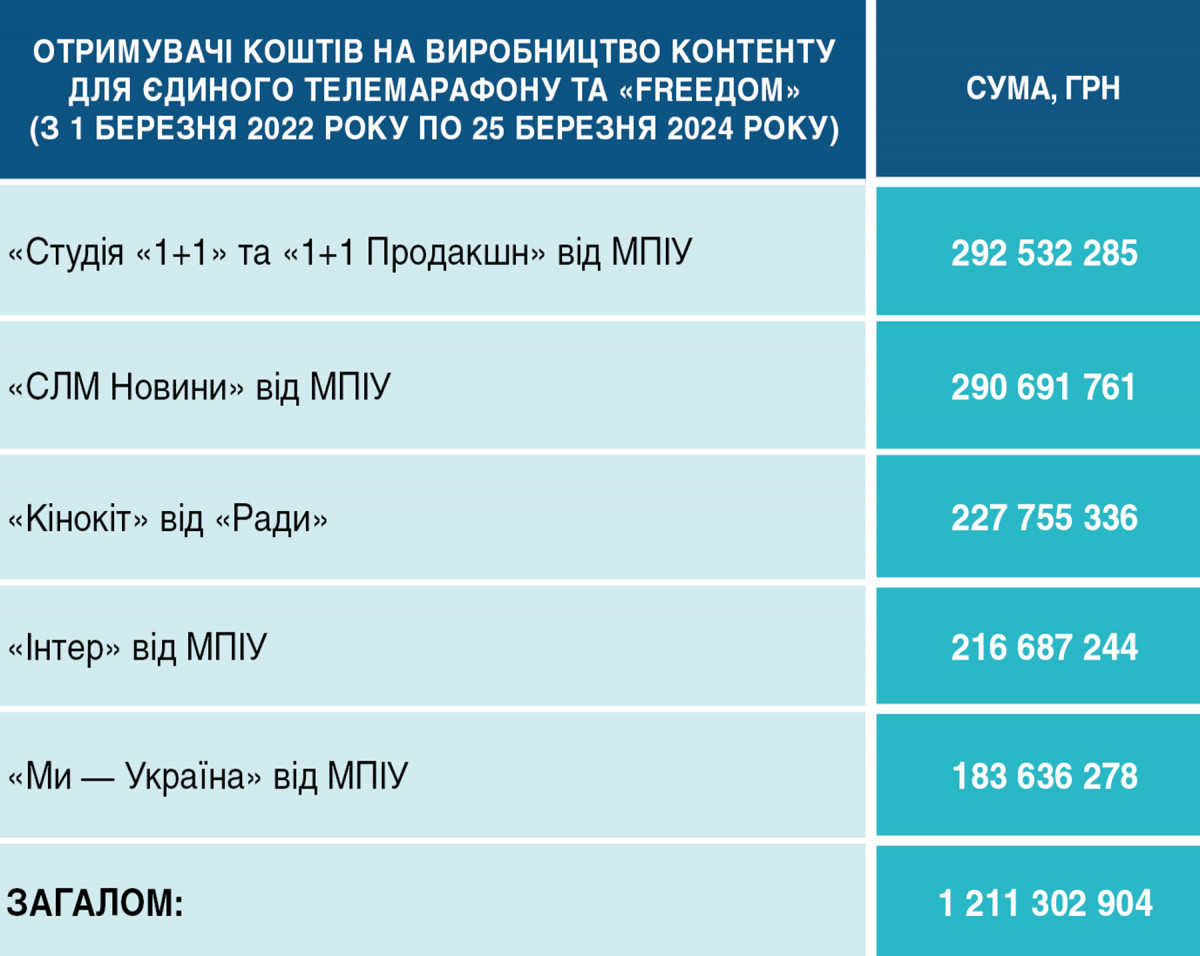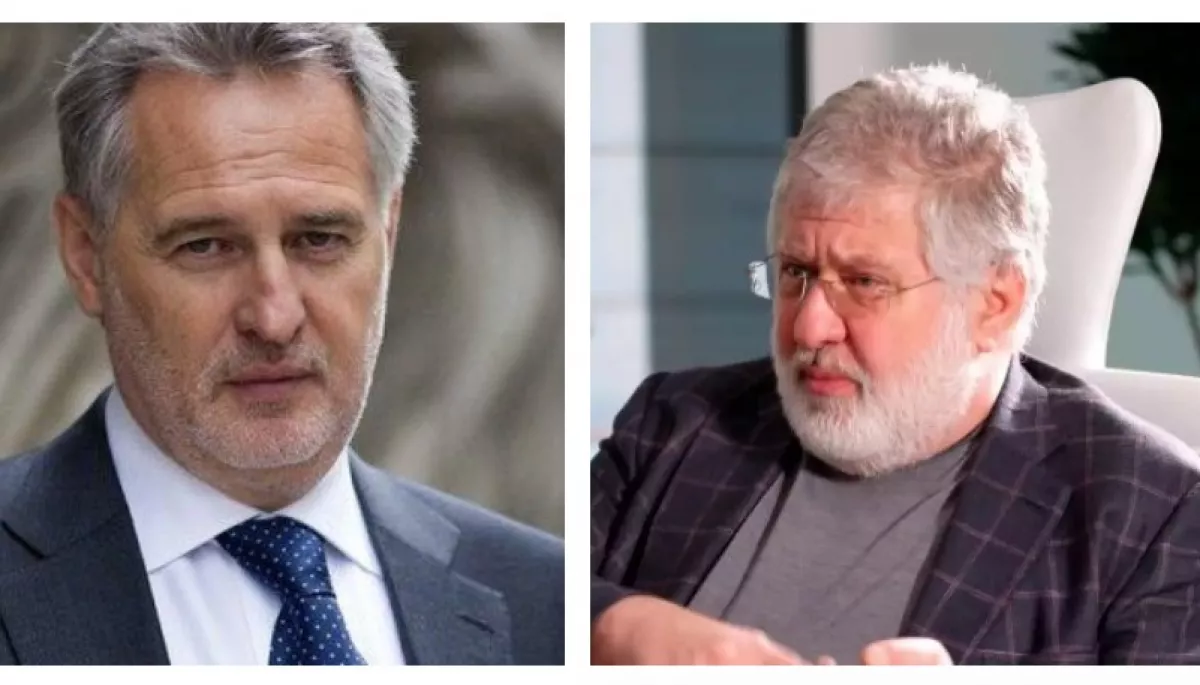Українською читайте тут.
On June 25, Ukraine's President Volodymyr Zelenskyy extended sanctions against Ukrainian businessman Dmytro Firtash, a co-owner of "Inter," for another 10 years. Just three days later, it was announced that his media group is launching a new channel, Inter Ukraine, in which, according to Forbes Ukraine, it plans to invest up to seven million dollars.
Personal sanctions against Dmytro Firtash were first introduced in 2021 due to his involvement in the titanium business and supplying raw materials to Russian military enterprises. Firtash denies these allegations and is challenging the sanctions in Ukrainian and international courts. He has been residing in Vienna since 2014 due to an FBI (USA) case against him.
In May 2023, the Security Service of Ukraine (SBU) named Dmytro Firtash and his top managers as suspects of embezzling state-owned gas worth 18 billion hryvnias. In August of the same year, Firtash's assets worth 7.4 billion hryvnias were arrested in Ukraine in the framework of this case. However, this has not impacted his media group, which he controls through the Group DF conglomerate. Furthermore, a few months after he was named a suspect, in July 2023, Dmytro Firtash bought a share of the channel from Serhiy Lyovochkin, increasing his ownership in "Inter" from 53.4% to 59.5% (Lyovochkin was among the channel's owners but had an indirect stake of less than 10%, specifically 9%, which Firtash acquired).
Thus, it is evident that the authorities do not intend to close Inter or confiscate it from the owners. Instead, they are interested in the channel's participation in producing the United News telethon. The media group received new management headed by Supervisory Board member Serhiy Sozanovskyi and a new contract for producing the United News telethon and content for foreign broadcasting (122.3 million UAH + 25 million UAH + 48 million UAH).
Thus, we have a paradoxical situation in which the government imposes sanctions on the owner but does not nationalize the asset but invests millions in its operations.
This is not the only case involving sanctions against media owners. Another major media group, 1+1, continues to develop even after Ihor Kolomoiskyi's arrest. In the fall of 2023, the 1+1 Media group announced that by the decision of the owner Ihor Kolomoiskyi, corporate rights in the media holding are transferred under the management of the labor collective represented by the current Director General of the company Yaroslav Pakholchuk. Following this began the process of transferring the group's channel brands to new legal entities which now don’t belong to Ihor Kolomoiskyi, Ihor Surkis, or Viktor Medvedchuk's wife Oksana Marchenko (Oksana Marchenko was among the owners of 1+1 as of November 2023).
LLC Solutions is now listed as the channel's owner on the 1+1 website, positioned as a private business owned by 1+1 Director General Yaroslav Pakholchuk and Viasat platform owner Svitlana Mishchenko. This company owns the cinema and television platform Kyivstar TV (legal entity LLC Plus TV), satellite operator Viasat (LLC Vision TV), channels Comedy Central (LLC Vision Media) and UNIAN (LLC DGone). Additionally, the company engages in channel distribution and digital segment business. Yaroslav Pakholchuk and Svitlana Mishchenko also own the new Vision company group: Vision 1+1, Vision 2+2, Vision 3, and Vision 4. These channels participate in competitions and acquire new licenses.
This unique situation pertains specifically to large groups involved in producing the telethon. That is because other media owners are also under sanctions. For instance, Vitaliy Kropachov is under suspicion and arrest. However, this directly affected his channel's operation, with layoffs occurring, and according to the director, UWN can survive only for a few more months.
What is happening with the 1+1 and Inter media groups? Where do they get their funding, how do they earn money, and are they really under Bankova's [President’s Office of Ukraine] control?
How Media Groups Spend Their Money
Each media group has its own structure and economy, staff, functions, and so on. The main expenses are content production, staff salaries, broadcasting, premises rent, and administrative services.
Understanding broadcasting expenses is straightforward. On average, a channel on T2 costs about 15 million UAH per year, while on satellite, it’s around 100,000 UAH. The Inter group has eight channels (for now, soon it will probably be nine), and 1+1 has ten licenses (three channels in MX-7 are yet to be launched). This totals approximately 1,440–1,800 million UAH annually.
Staff and management salary expenses are harder to quantify as they depend on the number and level of specialists. Since the onset of the full-scale war, all media groups have conducted layoffs and restructurings, reducing their staff by about three times on average. For instance, 1+1 Media reduced its personnel by 24%. The number of in-house production projects decreased, and channels abandoned large-scale studio projects and those involved in their creation.
The exact cost of remunerating the leadership is unknown. However, for example, Oleksandr Bohutskyi's salary, indicated in his wife Olena Kondratiuk’s 2023 declaration, is 22,911,032 UAH for his primary job and 18,936,371 UAH for his secondary job (the declaration for 2023 does not specify the jobs, but the MP's declarations for previous years state that her husband's primary job is with the International Commercial Television and Radio Company (ICTV), and his secondary job is with Starlight Media LLC).
In addition to optimizing staff, other expenses are also being cut. For example, Inter gave up renting buildings, retaining only the one at 30 Dmytrivska Street, where it relocated employees from the Bulvarno-Kudriavska Street building.
A significant portion of funds goes towards content production. Before the large-scale war, this included large-scale shows, series, and news. Channels continue to produce content, but with significantly smaller budgets, attempting to monetize existing content in every possible way.
As Yaroslav Pakholchuk mentioned, his group planned to spend one billion hryvnias on all content in 2023.
Are Marathon Investments Enough to Sustain Media Groups?
The government has been funding the production of the United News telethon for several years. Before the full-scale war, channels invested millions in producing news, studio projects, political talk shows, weekly reviews, and analytical programs. Now, the government covers this niche by financing United News and producing content for the Freedom foreign broadcaster.

New contracts for the current year were signed with media groups this spring. For instance, LLC Broadcasting Company "Studio 1+1" from Ihor Kolomoiskyi's group received 139 million UAH for United News (155,000 UAH per hour), and the foreign enterprise 1+1 Production received 48 million UAH for FreeDom (92,000 UAH per hour). PJSC Inter TV Channel also signed new agreements for marathon production — 122.3 million UAH plus 25 million UAH, as well as 48 million UAH for FreeDom content production.
Thus, marathon producers receive over $400,000 per month. These amounts are comparable to news channels' full-fledged budgets. But are these funds sufficient for media groups?
"Obviously, no media enterprises can fully support themselves now without radical cost cuts, closing part of their business, and so on. And they won’t be able to until the end of the war. I believe that for both media groups, the budget money they receive for marathon production and Russian-language foreign broadcasting content is very important. This money has replaced the subsidies from the owners that these media groups used to survive and develop. Thanks to this money, plus income from advertising and other healthy sources at a time when the market competition has significantly weakened, and there is no longer an 'arms race' — the competition for the most expensive international format or Russian series, which constituted a significant part of the 'investment' expenses of the real owners in these media groups — these media groups can survive," says media expert Otar Dovzhenko.
According to him, the ambiguity of the situation, where media groups are developing despite having sanctioned owners, is apparent and pushes for a "better understanding and definition of what is happening with Ukrainian media (particularly with national television)", “In the spring, Yaroslav Yurchyshyn, chairman of the Rada's Committee on Freedom of Speech, offered his own version (in an interview with RBC-Ukraine), ‘The state has effectively chosen a soft form of de-oligarchization, where we provide small financial resources, and the channels, in turn, guarantee adherence to certain editorial standards, ensuring that some Solovyovs or Simonyans don’t appear on air.’ However, when the state takes control of a business, begins financing it from the budget, and determines its operational principles (in our case, editorial policy and participation in the marathon), it is known under a slightly different term: nationalization. The ownership doesn’t legally transfer to the government, but only formally. In reality, these media have been confiscated for government needs, which is why no sanctions apply to them.”
It seems the government didn’t want to engage in nationalization since a more convenient control mechanism was found. In the case of nationalization and transferring rights to ARMA, all processes would be more transparent, and maintaining these media would be more expensive for the state.
According to Otar Dovzhenko, a new form of ownership has emerged in Ukraine: private on paper, state-owned in essence, "Releasing these media 'into the wild' is not an option. If the government stops subsidizing them from the budget, they will have to shut down or radically cut back; their real owners can neither sell nor continue to maintain them (and even if they could, they likely wouldn't because, in the current conditions, these media can’t be used to promote their interests, as there are no elections or political processes). It would be fair to nationalize these assets, but this contradicts the EU-agreed policy of rejecting state ownership in the media sphere. It would be nice and useful to transfer these assets to the Public Broadcasting Company, but that, as they say, just wasn't meant to be. Although..."
Three different sources from the media market and government bodies told Detector Media that state funds are crucial for the Inter group, as well as for My-Ukraina, as these projects wouldn’t survive otherwise. "Inter still earns something thanks to its commercial channels. But there are no investments from the owner. And My-Ukraina exists solely thanks to the funds they receive from the government," a DM’s source said.
In contrast, the remaining groups, including 1+1 and StarLightMedia, co-finance content creation for the marathons with their own funds. One source mentioned that the groups invest 30% in production, while another suggested 40-50%.
"1+1 and StarLightMedia could walk away from the marathon now because they earn enough, and they don’t need this public money. The marathon is unprofitable for them. They co-finance it with their money," a DM’s source said. "And since they co-finance the marathon, they make the authorities grateful to them." According to the mentioned source, those who don’t fully depend on public money and have their own means of income are engaged in negotiations rather than under total control, as is the case with the My-Ukraina or Rada TV channels.
Who is the government negotiating with? Obviously, not with the sanctioned owners. However, media assets are also controlled by other partners. For instance, despite the sale of property, sources in government bodies told DM that Serhiy Lyovochkin controls Inter. Marathon-related issues were settled with him. He exercises strategic control, while Serhiy Sozanovsky handles operational management.
According to sources, the 1+1 asset is directly controlled by Ihor Palytsia and Hennadiy Boholiubov (the latter recently also fled the country).
"Even after the war ends, it will be difficult to wean media groups off state subsidies. I wouldn’t be surprised if new formats and justifications for continuing state funding are invented. For now, it will be interesting to watch another monetization hybrid: selling advertising in the telethon. This idea has been around for a while, but media groups only dared to implement it when the telethon significantly lost viewership (and potential advertising inventory), and the country plunged into prolonged energy problems," said Halyna Petrenko, director of the NGO Detector Media.
Media Business for Entertainment Television
When Rinat Akhmetov closed his Ukraine Media Group, the market had one less "mouth" to feed. Despite its drop due to the war, it is still capable of feeding the other major players. Thus, entertainment television in wartime conditions has achieved its long-standing goal of becoming a media business. According to sources, media groups spend as much as they earn and on what they can generate revenue from.
According to the register, the companies of the Inter and 1+1 groups show profits in 2023, whereas last year, the channels were at a loss. For example, PJSC Inter TV Channel has a net profit of 838.8 million UAH (last year, the net income was -552 million UAH). Other channels in the group have smaller profits: NTN earned 14,200 UAH, Mega made 16.5 million UAH, and K1 brought in 47 million UAH.
Most companies in the 1+1 Group also show a profit. Their income reaches hundreds of millions, with profits, for instance, at 2+2 (LLC Real Estate-TV) at 122.8 million UAH, TET (PJSC TET TV Channel) at 39.6 million UAH, and the Viasat operator (LLC Vision TV) earning 103.8 million UAH. The company LLC Solutions earned 1.7 million UAH.
In 2023, only the legal entities of the 1+1 channels showed losses: LLC TV and Radio Company “Studio 1+1" had a profit of -244 million UAH, and 1+1 Ukraine (LLC Vision 1+1) had a profit of -504 thousand UAH. A year ago, in 2022, the net profit of 1+1 had reached more than a billion.
Budgets for content have decreased, and series have become cheaper. The state also supports by commissioning several series through the foreign broadcasting platform, with non-exclusive rights to broadcast granted to media groups. These are different costs compared to in-house production.
Channels are actively monetizing content filmed in previous years. New so-called FAST channels (free ad-supported streaming television) are being created for this purpose. These thematic channels, such as StarLightMedia’s Supermama (Supermom), Tviy Serial (Your Series), Tviy Humor (Your Humor), etc., are created not only for OTT platforms but also for T2 digital television. They produce little new content, focusing on monetizing existing content.
Similarly, the launch of the new channel Inter Ukraine (which submitted an application for a digital competition) aims to monetize content from the group's collections or from Film.ua, owned by Serhiy Sozanovsky. The group also has bundles of purchased content. However, the channel's management wants to invest in the new project. "To compete with top players, you need to invest $5-7 million in a new channel," said Serhiy Sozanovsky to Forbes Ukraine. It is unknown whether these will be the group's own funds or external investments. This channel seems to be created on the same principle as 1+1 Ukraine and ICTV2, launched as duplicates of the main channels involved in marathon production.
Media groups earn primarily from advertising. In the early years of the full-scale war, TV channels survived thanks to infomercials, broadcast in the morning and evening on some leading channels. The television panel, used for selling advertising, has been updated.
In addition, media groups operate as businesses in various segments of the media market, not focusing solely on television. "The rebuilding from TV to media is a deliberate strategy. This year [2023], television advertising accounts for only a third of our income. Advertising overall provides 60-65%. It is the main, but not the dominant, source of income," said Yaroslav Pakholchuk during KMW. He predicted that in 2024, the share of advertising in the income structure would be less than 50%.
Western donor grants have become important for media groups. Starlight Media, for instance, has its own grant department, with grants making up 10% of the media group's income. For example, the series Holova (The Head) on the Novyi Kanal (New Channel) and Botoferma (Bot Farm) on ICTV were created with support from an independent agency of the US federal government (USAID). Key areas include digital, whose revenue, according to Bohutskyi, grew fivefold last year.
Digital monetizes both entertainment and marathon content. Currently, digital is an earning opportunity for small channels. As a DM’s source stated, Channel 5, Pryamyi, and Espreso, which were cut from digital broadcasting, are very well monetized digitally, particularly on YouTube, and returning to digital broadcasting could be unprofitable for them.
Thus, evidently, entertainment television has succeeded in becoming a business. However, it is unclear how long this multi-level content monetization tactic can last without significant investment in new products or whether advertising revenue will remain stable amid prolonged power outages. Informational and analytical TV, on the other hand, is unlikely to survive without investments. After the marathon ends, without state or media owner investments, news content won’t be at the same level as it was before the war. Much will depend on who and how much will be interested in such investments. Currently, most of the audience gets news from other platforms (such as Telegram). In this new reality, Public Broadcasting can play a significant role. Its exit from the marathon and resumption of independent broadcasting can create an alternative and gather a television audience of, in the words of media expert Ihor Kulias, "critically thinking people" if it becomes more demanding in adhering to journalistic standards, "If this is done, I am confident that the audience of Public Broadcasting will eventually outweigh the marathon's audience." And preserve the niche for news television.



